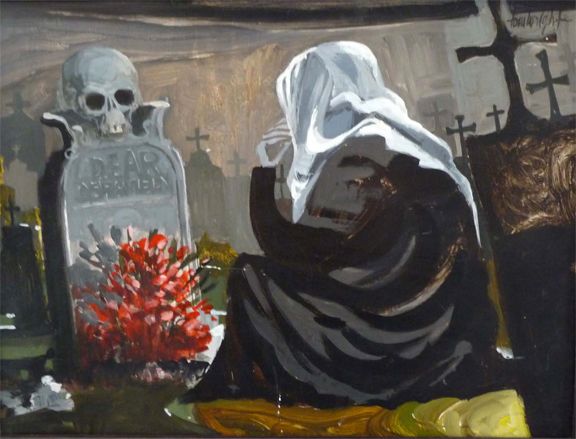
This entertaining story by American fiction writer Alice-Mary Schnirring was later on adapted by Rod Serling into an episode of his TV series Night Gallery. Here it is, written by me for the blog in Centennial Gregg.
Attachment: the-dear-departed.pdf
Another reading I am so looking forward to transcribing! Thank you Susan Johnston
You're welcome!
Transcribed this while sitting on a plane for 4 hours, what a story! I see why Rod Serling adapted it to "Night Gallery". Thanks again! Susan Johnston
Awesome, glad you liked it!
This is a great story! Thanks for posting it, Carlos.
One of my long-standing hobbies has been magic (performance, not occultism). We in the magic community understand how these guys do their thing, and what tricks they use to bilk people. So Joe's and Mark's cynicism and dishonesty strike a chord.
If you want to know how séances work, read Houdini or Randi. For fortune-telling, there's a very short book (terribly badly written) called The Art of Cold Reading.
On the other hand, Joe is ascribed more powerful ventriloquistic ability than anyone can really have. What he did to the truck driver is actually impossible. But it's acceptable as the story moves gradually from its plausible beginning to its fantastical ending.
You're welcome! In the TV adaptation, Serling switched the names of the two main characters, added another one, and tamed some of the elements of the story; still, it was a riveting tale. You may want to watch that episode if you have a chance.
Night Gallery is one of my favorite shows.
I'll definitely watch that episode. I grew up in the Twilight Zone era, and found Rod Serling's stuff fascinating.
It is. I have been watching the old Twilight Zone episodes during the pandemic (previously I had watched just a handful of them). Some of episodes were based on stories published in pulp magazines of the era, and I have been lucky in finding some online. I’m so glad people are digitizing these magazines: there are so many good stories there!
I've now watched the Rod Serling adaptation of this story. I notice the addition of the illicit love affair; nothing really unusual there, but it adds some spice. Serling also makes the assistant's death a real accident, wished by the medium, not involving him at all, but benefiting his love affair (echoes of Lolita here). I think I have an inkling why Serling may have interchanged the names, making the medium Mark and the assistant Joe: Mark is a more "elegant" name than plain Joe, just as Serling makes the medium out to be more urbane than the assistant.
Carlos, had you not posted the story, I would have been unaware of it, as well as of Serling's adaptation. Thanks again!
You're welcome!